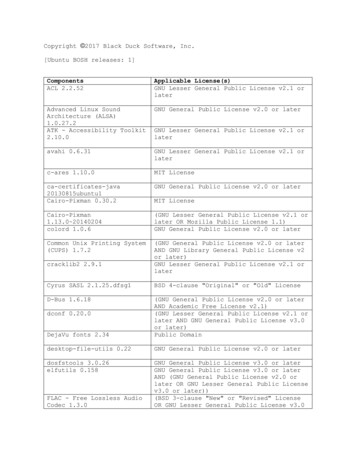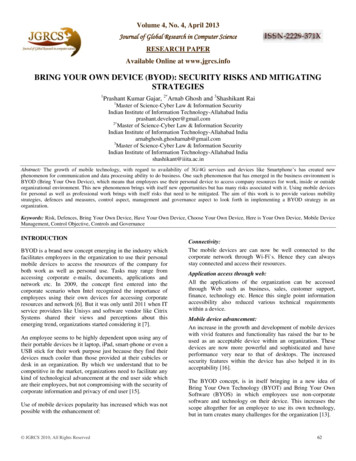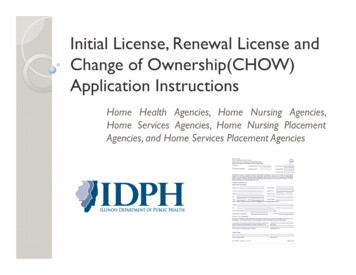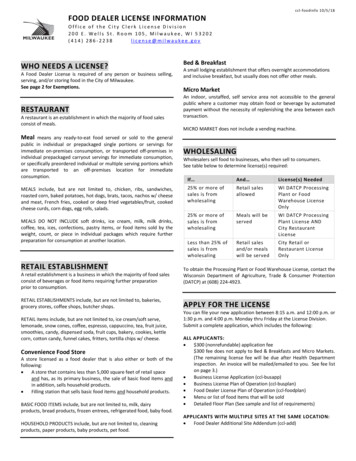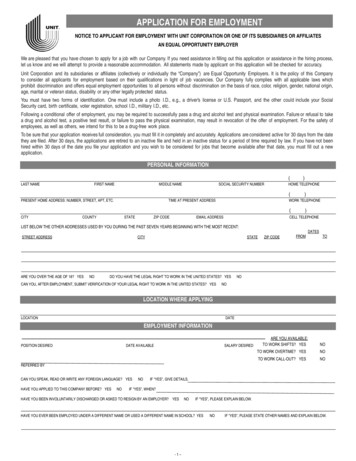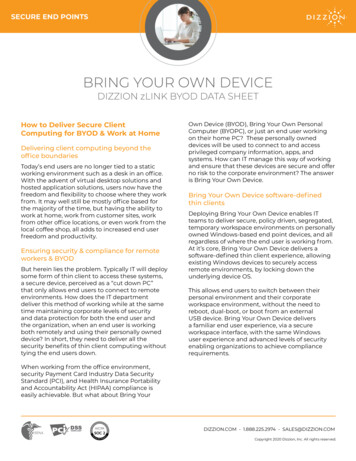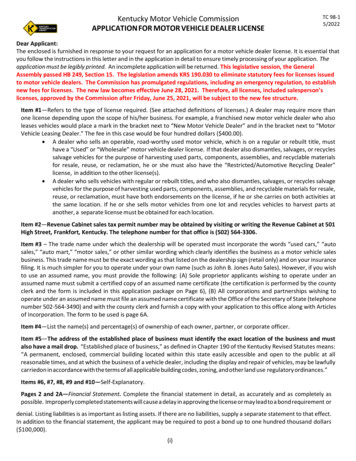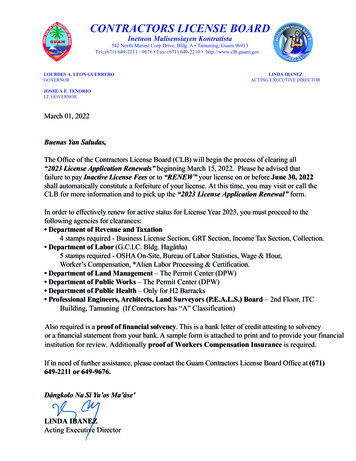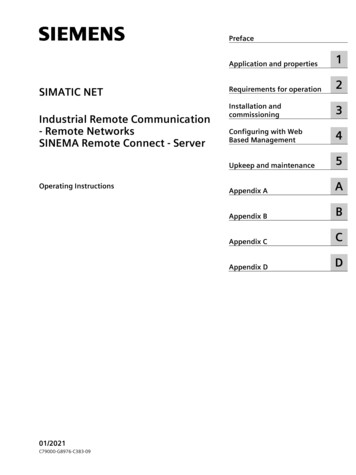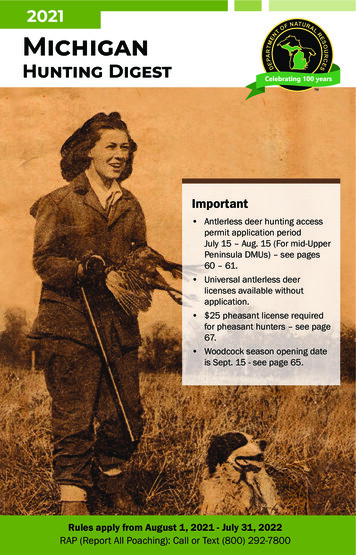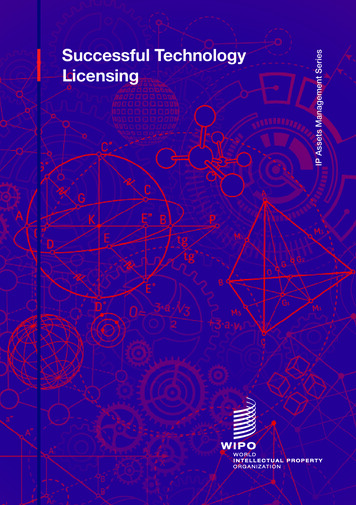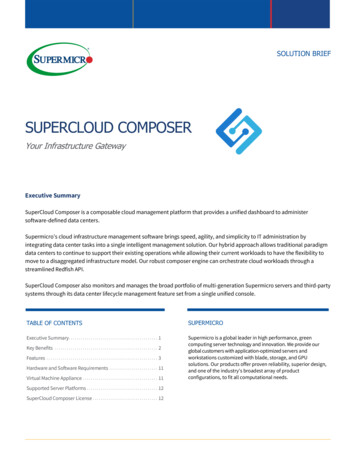
Transcription
Bring Your Own Licenseand Universal Credits:Simplifying Cloud Purchasing and ConsumptionCloud Essentials
Many organizations today, whileeager to move to the cloud, haveconcerns around the financialobstacles that often force themto decide between the flexibilityof the cloud and the need toreduce costs and risk.At the core of the issue are the legacy on-premises investments that many companies have already made inapplications, tools, and infrastructure. Without a clear-cut plan to leverage them in the cloud, organizationsoften balk at the notion of having to invest yet again in those same solutions.There are several other obstacles that make the process of moving to the cloud more challenging: When it comes to paying for cloud services,many cloud providers require companies tonotify them in advance of the specific cloudservices they’ll need, as well as how andwhere they’re going to run them. This canhamper business responsiveness and resultin unpredictably higher operational costs. With most cloud providers, shifting cloudspending to different platform and infrastructureservices as a result of changes in businessstrategy is often complicated. Complex cloud payment models from most cloudproviders today give organizations limited visibilityinto (and control over) cloud spending.
Oracle’s new cloud programs, however, addressthese cloud-adoption challenges by making thejourney to the cloud more affordable and bysimplifying the way you purchase and consumecloud services. Specifically, Oracle has introducedtwo new programs for buying and using cloudservices that help you get more value from yourexisting Oracle software investments with lesscomplexity. These programs are Oracle Bring YourOwn License (BYOL) to PaaS, and Oracle UniversalCredits (UC).Together, these help accelerate your transition tothe cloud for greater competitive advantage withtremendous choice and flexibility. Oracle has alsolowered PaaS pricing (in some cases up to 94percent cheaper versus the previous PaaS list price)and reduced IaaS list prices as low as Amazon’s,reducing barriers to cloud entry, as well as risk,for all sizes of businesses.Oracle has always had a BYOL program in placeto allow customers to bring on-premises licensesto Oracle IaaS. With this new extended BYOLprogram, on-premises software such as OracleDatabase and Oracle Middleware can now be portedto corresponding Oracle PaaS services at thenew reduced Oracle PaaS prices.In addition, Oracle Universal Credits make theconsumption of cloud services simple andflexible across PaaS and IaaS by using a singlecontract that doesn’t require you to notify Oracleof changes. You simply pay up front and consumeas you wish. In addition, you can use our UniversalCredits to purchase on-demand access to all currentand future Oracle PaaS and IaaS services (such asdatabase, integration, analytics, security, compute,and storage) with a pay-as-you-go model. You canpay even less by using prepaid pricing for as longas you need.This paper explains how you canbenefit from these new programsand leverage the high automation ofOracle Cloud to accelerate innovationand significantly lower your total costof ownership. Oracle’s new BYOLto PaaS and UC are available todayto support new or existing workloadsacross Oracle Cloud and OracleCloud at Customer.
BYOL: License Mobility from On Premises to PaaSOracle BYOL allows you to apply licenses youown for on-premises software for equivalent, highlyautomated Oracle PaaS services in the cloud. Untilnow, Oracle customers had been limited to movingon-premises software investments only to IaaS.With this new program, however, licenses canbe used for corresponding Oracle PaaS servicesfor 100 percent workload compatibility and licensemobility in Oracle Cloud.Shifting Oracle database, middleware, and analyticslicenses to Oracle PaaS provides the lowest possibleTCO and greatest value for customers. That valueis further magnified by the power of Oracle Cloudversus the competition. Not only are Oracle IaaS listprices as low as Amazon Web Services’ (AWS), butOracle Cloud also uses less compute and storage torun Oracle database workloads than AWS.This results in even greater savings. In addition,a large portion of the cost of running a databasecomes from labor rather than from infrastructure.These costs are reduced with Oracle PaaS,which offers advanced automation of processesand tools associated with the database to handleall sorts of complex configurations automatically.Additionally, Oracle PaaS services run not only ona standard cloud infrastructure; they can also runon a highly specialized database infrastructure(such as Oracle Exadata Cloud Service) givingyou even better performance and reliability.
BYOL to PaaS also allows you to transfer your OracleMultitenant 12c database license from your enterprisesubscription to new Oracle innovations (including theworld’s first autonomous database cloud). OracleAutonomous Data Warehouse Cloud leveragesmachine learning for automation for more savings. Self-driving: Eliminates human labor to provision,secure, monitor, back up, recover, troubleshoot,and tune the database. Automatically upgradesand patches itself while running. Elastically growsand shrinks compute or storage without downtime,so you pay only for what you use. Self-securing: Automatically encrypts all data.Provides automatic security updates with nodowntime, along with protection from bothexternal attacks and malicious internal users. Self-repairing: Delivers automated protectionfrom all planned and unplanned downtime.Insurance Analysis WorkloadStartOracleAutonomous Data Warehouse Cloud; 16 OCPUWorkload Completed 0.03Queries Completed5 of 5Time ElapsedOracle delivers lower TCOfor Oracle Autonomous DataWarehouse Cloud in Oraclepublic cloud compared torunning Oracle Database onAWS. A test running identicalfinancial analysis workloadsfound Amazon’s solution tobe 8.3 more expensive.26sStartAWSAmazon 8.3 More ExpensiveOracle; i3.16Xlarge 0.25Workload CompletedQueries Completed5 of 5Time Elapsed282sKeynote Highlights, Oracle OpenWorld San Francisco 2017, video, .html?bcid 5595335512001&playerType single&size events
BYOL: License Mobilityfrom On Premises toCloud at CustomerOracle provides further choice with BYOL byallowing customers to apply on-premises licensesto Oracle Cloud at Customer, its solution for bringing allthe functionality of its public-cloud technology to yourdata center, behind your firewall. Oracle Cloud atCustomer is typically adopted by organizations andgovernments that have greater data regulations, anddata-sovereignty and compliance concerns. Becausedata is kept in your data center, Oracle Cloud at Customeralso offers lower latency for applications and databases.BYOL to PaaSCloud ServiceOracle Cloud Data CenterOracle-ManagedOracle Public CloudOn PremisesBYOL to PaaSCloud ServiceCustomer Data CenterOracle-ManagedCloud at Customer
Universal Credits: Flexible Buyingand Consumption for PaaS and IaaSBeyond expanding BYOL, Oracle hasdramatically eased the complexity of purchasingand consuming cloud services by introducingthe concept of Universal Credits (UC). Thesedramatically simplify how you purchase andconsume cloud services by offering a singlecontract to acquire, expand, transfer, or cancel anyand all current and future PaaS and IaaS services.Oracle BYOL and UC build upon Oracle’scommitment to delivering the world’s leadingcloud solutions in the simplest, most efficient wayfor customers. Previously, Oracle introduced itsAccelerated Buying Experience, which automates theend-to-end purchasing process, streamliningapprovals, removing the need to spend endlesscycles negotiating back and forth, and enablingyou to order cloud services at the click of a button.The Accelerated Buying Experience is designedto speed time to value and simultaneously freeup resources. Using Oracle’s own SaaSapplications, including Oracle Sales Cloud, OracleService Cloud, and Oracle Configure, Price, and Quote(CPQ) Cloud, Oracle can now complete ordersefficiently and more quickly than ever before.Unlike many of its competitors, Oracle offersboth a fast and simple buying experience, andfavorable terms across the broadest set of cloudservices. Also, Oracle customers now need only oneagreement for their entire cloud relationship with us.
To understand the differences between Oracle’s newUniversal Credits and other cloud providers’, let’s lookat a typical scenario where a customer buys US 1,000of credits with a provider. As an example, AWS customersneed to notify Amazon in advance how they’re going to usethose credits—on Redshift, in the West Coast data center,or in the East Coast data center. Customers also need toexplain how much is going where, and how much theyexpect to consume. Based on that information, Amazoncalculates a discount and generates a contract.By contrast, Oracle Universal Credits has a far simplerprocess. You simply commit to a certain amountof spend over a specific period of time (such as US 1,000over the next 12 months). You aren’t required to determinehow much is going to be spent on IaaS or PaaS, for example,or in which data center. You’re free to purchase, consume,or shift spending however you see fit over the course of thetime period. Oracle determines which services you use anditemizes them against the purchased credits.Buying from AWSBuying from Oracle You specify individual servicesand quantities at contract/bookingfor reserved instances You select Monthly Flex and dollaramount at contract signing The services and data center forprovisioning are locked into the initialorder for reserved instances You may need to sell the reservedinstance on the secondary market,buy a new instance, then migrateto that new instance A new order is required toutilize latest services You utilize any infrastructureand platform cloud serviceanywhere, anytime You can switch services as neededwithout notifying Oracle You can adopt the latest servicesas they’re released without signingan order document
Consumption ChoicesThe credits also apply to any new services Oraclereleases, such as Oracle Autonomous Database.With Oracle UC, you don’t need a new contract fornew services. You simply select the service,and it’s applied against your Universal Credits.Universal Credits are applied to anything you wantto use. Data can be moved, for example, from onedata center to another without notifying Oracle.Similarly, cloud services can be cancelled and creditcan be reapplied to another service. Discounts aredetermined by dollar volumes and whether you choosea monthly or annual commitment. Specific SLAs,limitations, and liabilities can still be negotiated.Pay as You Go (PAYG)Universal Credits Monthly Flex No upfront commitment One-year minimum term Pay only for what you use Agreed-to monthly spend Pay in arrears based on usage List price Built for land and expand Best when usage is uncertain Elastic payments based on usage PaaS savings versus PAYGstart at 33 percent Additional discounts basedon size and term of deal Predictable spending Spend more, save moreOracle continues to offer a pay-as-you-go approach to using cloud serviceson demand. With UC, larger volume discounts are available with monthlyor annual commitments. These are often favored by large corporations orgovernmental agencies.
The Simplicityof Buyingand ConsumingCloud ServicesOracle uniquely provides the most flexibility and choice for cloudpurchasing and consumption, with immediate business benefits: Bring Your Own License (BYOL) empowersexisting customers with license mobility for OraclePaaS to exchange at new lower PaaS pricing Universal Credits (UC) make contracts easy andconsumption flexible, allowing customers accessto all current and future PaaS and IaaS solutions There’s the ability to upgrade PaaS andIaaS services using current subscription You have access to new serviceswith current subscription There’s elastic scaling of prepaidPaaS and IaaS instances There is service portability acrossCloud at Customer and the public cloud Lower list prices, higher performance, and moreautomation provide the industry’s lowest totalcost of ownership
Capitalize on Oracle Cloud Platform NowWith Oracle’s new BYOL and UC programs, it’s easier than ever for you to purchase andconsume all current and future Oracle Cloud solutions. Oracle’s complete, open, secure,intelligent solutions provide maximum flexibility and choice for you to build your own unique pathto the cloud rather than follow a provider’s cookie-cutter plan. Oracle’s broad and deep portfolioof services makes it possible for you to address any business challenge by moving to cloud,using emerging technologies, such as artificial intelligence (AI), machine learning, blockchain,chatbots, and more to shift your focus from maintaining IT investments to innovating new waysto compete and succeed.Move workloads.Oracle Cloud Platform provides the choiceand freedom to sequence workload migrationshowever you’d like—from SaaS, PaaS, or IaaS.You can lift and shift apps, databases, andVMs to IaaS without the cost and complexityof manual migrations and rewrites. Or youcan lift and shift workloads directly to PaaS,allowing you not only to retire infrastructureand reduce cost (some customers claimup to 60 percent reduction in TCO),but also get the benefits of automationso that you can focus on outcomes versusadministration. In addition, you can improveoverall application performance and leverageanalytics in the cloud.Develop and deploy.Oracle’s integrated, standards-based solutions fordeveloping and deploying apps are technology-agnostic,providing more choice for development environments.Built with DevOps in mind, Oracle includes automationtools for continuous deployment, with integrated securityand management tools for monitoring, compliance,and governance. Oracle also makes it possible to buildmodern cloud-native apps, including microservices, APIs,mobile apps, and chatbots.
Modernize data management.Connect and extend.Oracle’s integrated, comprehensive cloud platform manages anydata (structured or unstructured) and supports any application withthe ability to scale—from new custom apps to data warehousingto real-time analytics. It allows you to consolidate your databasefootprint to reduce costs, while also offering automated tooling forupgrading, patching, and provisioning that can improve productivity.Critical to supporting the journey to the cloud is providinga platform that allows customers to connect apps, data, APIs,and content across clouds and on premises. Oracle automatesand orchestrates business processes across systems andapplications, with the ability to extend capabilities, differentiate,and create modern experiences—for customers or employees.Insights for business transformation.Oracle Analytics Cloud allows customers to visualizebusiness performance by asking any question of any dataset,going beyond dashboards to see hidden signals and exploreunanswered questions. Powerful predictive and modeling toolsanticipate outcomes, asking what-if questions and quickly buildingand evaluating a range of possible scenarios. Oracle allows youto build enterprise data lakes to drive innovation and democratizedata access. You can also leverage traditional and new data typesto discover operational efficiencies and innovation.
Oracle Cloud PlatformComplete: Best-of-breed and integrated solutions in everycloud category—data, software, platform, and infrastructureOpen: Standards-based platform that supports all workloads,apps, languages, and data typesSecure: Automatic, always-on encryption that extends throughoutthe entire cloud stack, all the way down to the silicon layerChoice: Flexible deployment options—public, private,Oracle Cloud at Customer, and hybrid cloudIntelligent: Artificial intelligence and machine learning in everycloud category—data, software, platform, and infrastructure
Cloud EssentialsOracle Cloud PlatformThousands of customers, including some of theworld’s most recognizable brands, have embarkedon the journey to transform their business processeswith Oracle’s robust cloud platform.Contact your Oracle account manager to start yourjourney to the cloud, or visit oracle.com/byolto learn more.Try Oracle Cloud today. Go to cloud.oracle.com/tryit.Copyright 2018, Oracle and/or its affiliates. All rights reserved. This document is provided for informationpurposes only, and the contents hereof are subject to change without notice. This document is not warrantedto be error-free, nor subject to any other warranties or conditions, whether expressed orally or implied inlaw, including implied warranties and conditions of merchantability or fitness for a particular purpose. Wespecifically disclaim any liability with respect to this document, and no contractual obligations are formedeither directly or indirectly by this document. This document may not be reproduced or transmitted in anyform or by any means, electronic or mechanical, for any purpose, without our prior written permission.Oracle and Java are registered trademarks of Oracle and/or its affiliates. Other names may be trademarks oftheir respective owners. VDL50249 180405
licenses to Oracle PaaS provides the lowest possible TCO and greatest value for customers. That value is further magnified by the power of Oracle Cloud versus the competition. Not only are Oracle IaaS list prices as low as Amazon Web Services' (AWS), but Oracle Cloud also uses less compute and storage to run Oracle database workloads than AWS.
